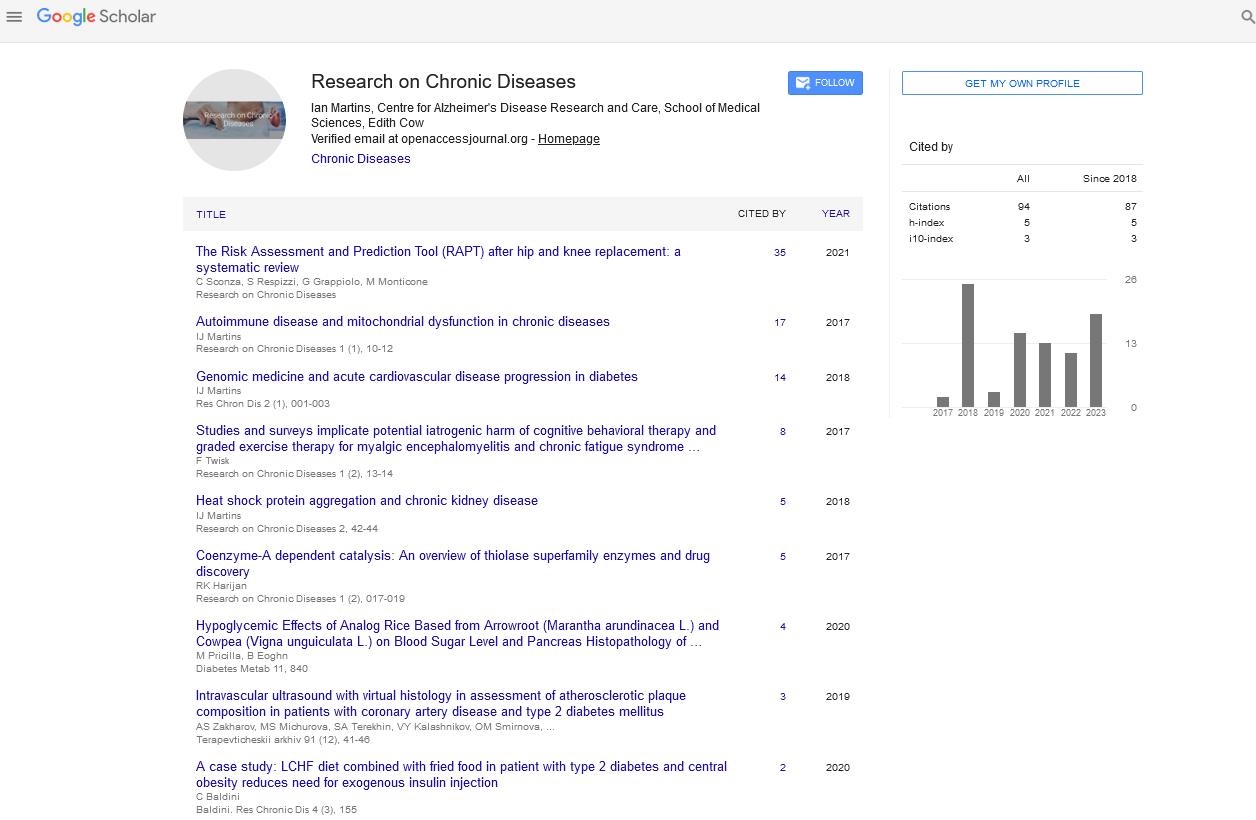Perspective - Research on Chronic Diseases (2024) Volume 8, Issue 5
Understanding Anxiety and Depression: A Holistic Approach to Mental Well-being
- Corresponding Author:
- Maeve Lichmen
Department of Psychology,
University of Halen,
Halen,
Belgium
E-mail: Maeve@gmail.com
Received: 04-Jul-2024, Manuscript No. OARCD-24-140624; Editor assigned: 09-Jul-2024, PreQC No. OARCD-24-140624 (PQ); Reviewed: 23-Jul-2024, QC No. OARCD-24-140624; Revised: 01- Oct-2024, Manuscript No. OARCD-24-140624 (R); Published: 29-Oct-2024, DOI: 10.37532/ OARCD.2024.8(5).226-227
Introduction
In the realm of mental health, anxiety and depression stand as two of the most prevalent and impactful conditions affecting millions globally. Beyond mere diagnoses, they represent complex emotional landscapes that profoundly influence how individuals perceive and interact with the world around them. This article delves into the multifaceted nature of anxiety and depression, exploring their causes, symptoms, treatments and the crucial importance of holistic care in managing these conditions effectively.
Description
The landscape of anxiety
Anxiety manifests in various forms, ranging from Generalized Anxiety Disorder (GAD) to specific phobias and panic disorders. At its core, anxiety involves excessive worry and fear that can interfere significantly with daily life. While it’s normal to experience occasional anxiety, persistent and uncontrollable feelings of apprehension can lead to distressing physical and emotional symptoms.
Causes and triggers: Anxiety disorders often stem from a combination of genetic, environmental, and psychological factors. Traumatic experiences, chronic stress, and family history can contribute to its development. Additionally, certain medical conditions and substance abuse may exacerbate symptoms.
Treatment approaches: Treatment typically involves a combination of psychotherapy, medication, and lifestyle changes. Cognitive-Behavioral Therapy (CBT) is particularly effective, helping individuals identify and modify negative thought patterns. Medications such as Selective Serotonin Reuptake Inhibitors (SSRIs) and Serotonin-Norepinephrine Reuptake Inhibitors (SNRIs) are commonly prescribed to manage symptoms.
Navigating the depths of depression
Depression, often referred to as Major Depressive Disorder (MDD), presents as persistent feelings of sadness, hopelessness, and disinterest in activities once enjoyed. It affects how individuals think, feel, and handle daily activities, often leading to significant impairment in various aspects of life.
Causes and risk factors: Like anxiety, depression results from a complex interplay of biological, environmental, and psychological factors. Imbalances in neurotransmitters such as serotonin and norepinephrine, alongside genetic predispositions, contribute to its onset. Life events such as loss, trauma, or chronic stress can also trigger depressive episodes.
Symptoms: Symptoms of depression encompass emotional, cognitive, and physical domains. These may include prolonged sadness, feelings of worthlessness or guilt, loss of interest in hobbies, changes in appetite or weight, sleep disturbances, and thoughts of death or suicide.
Treatment approaches: Effective treatment strategies for depression involve psychotherapy, medication, and support from loved ones.
Cognitive-Behavioral Therapy (CBT) helps individuals challenge negative thought patterns and develop healthier coping mechanisms. Antidepressant medications, including SSRIs, SNRIs, and tricyclic antidepressants, are prescribed to alleviate symptoms and rebalance brain chemistry.
Holistic management: Holistic approaches for managing depression include regular physical activity, which boosts mood-regulating neurotransmitters and promotes overall wellbeing. Social support networks, involving friends, family, or support groups, provide emotional reassurance and reduce isolation. Mind-body practices like acupuncture, yoga, and meditation offer additional avenues for enhancing mental resilience and promoting relaxation.
Diagnosis and challenges
Diagnosing fibromyalgia remains a clinical challenge due to its diverse and often overlapping symptoms with other conditions. Physicians typically rely on a combination of patient history, physical examination, and exclusion of other possible causes of symptoms. The American College of Rheumatology guidelines emphasize the presence of widespread pain and tenderness in at least 11 of 18 specified tender points as key diagnostic criteria, though newer guidelines focus more on a comprehensive assessment of symptoms.
Understanding the mechanisms
The exact mechanisms underlying fibromyalgia are not fully understood, but research suggests that abnormalities in pain processing and neurotransmitter signaling play crucial roles. Factors such as genetics, infections, physical trauma, and psychological stress may also contribute to its development. Studies have highlighted alterations in the central nervous system, including increased sensitivity to pain signals and abnormalities in neurochemicals like serotonin and dopamine, which regulate mood and pain perception.
Impact on quality of life
Living with fibromyalgia can significantly impair quality of life. Chronic pain and fatigue can limit physical activity and lead to social isolation. Sleep disturbances and cognitive dysfunction further exacerbate these challenges, affecting work productivity and interpersonal relationships. The unpredictable nature of symptoms often necessitates a multidisciplinary approach to management, involving healthcare providers, mental health professionals and supportive care networks.
The mystery of its cause
The exact cause of fibromyalgia remains elusive, although researchers believe it involves a combination of genetic, environmental, neurobiological, and psychological factors. Some studies suggest abnormalities in pain processing by the central nervous system, leading to an increased sensitivity to pain stimuli (hyperalgesia) and an amplified response to non-painful stimuli (allodynia).
Conclusion
Anxiety and depression are complex mental health conditions that impact millions worldwide, transcending mere diagnostic labels to encompass profound emotional and psychological experiences. Through a holistic approach encompassing clinical interventions, lifestyle modifications, and community support, individuals can cultivate resilience and reclaim their mental well-being. By fostering understanding, compassion, and proactive engagement, we can collectively pave the way toward a more supportive and inclusive future for all individuals affected by anxiety and depression.
